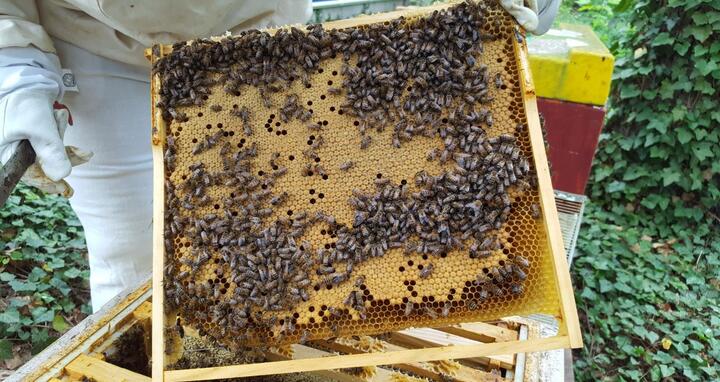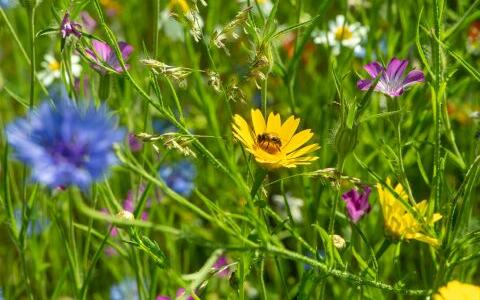Gläsernes Labor receives environmental award
The organizers of the awards encouraged all citizens of Pankow – in particular school classes, day-care center groups and youth clubs – to contribute projects and ideas for creating insect-friendly spaces within the city.
The applications were judged by a jury made up of political party representatives, the district councilor responsible for environmental issues – Daniel Krüger – and representatives of the environmental group Grüne Liga.
Prize winners included the garden club of the Raoul Wallenberg cultural and educational center, the Life Science Learning Lab (Gläsernes Labor) at the Berlin-Buch research campus, the Pankow beekeeping society, and BAUFACHFRAU Berlin.
About the winning project “Bee colonies, wildflower meadows, deadwood”
This Gläsernes Labor project includes a wide range of different activities and incorporates regional and transregional actors. In his laudatory speech, district councilor Dr. Yasser Sabek (SPD) highlighted the important role of social learning within the project. He also emphasized that, “In all their activities, those involved remain focused on the scientific approach.” The Gläsernes Labor received the Goldene Kröte (“Golden Toad”) traveling trophy and prize money of €400.
Bee colonies and wildflowers at our green campus
Gläsernes Labor has kept bees at the Berlin-Buch campus for several years now. It teaches students about the life cycle of bees and the important role they play in nature. The hives are equipped with temperature and moisture sensors as well as weighing scales.
Biodiversity has been promoted on the parkland area of the Buch campus since 2019, with the goal of providing a better supply of nourishment for insects. The campus worked with Eberswalde University for Sustainable Development to lay out particularly insect-friendly meadows. As well as woodland strawberries, wild carrots and cornflowers, project participants planted lesser-known species with tantalizing names like wild basil, motherwort, burnet-saxifrage and greater yellow-rattle. Around 150 different species of wildflower now grow here. The project is set to run for five years and is being scientifically monitored.
Insect-friendly flowering meadows on the Buch research campus.
Bee workshops during school vacation
This August, Gläsernes Labor will once again team up with the Buch municipal library and children’s organization Spielkultur Berlin-Buch to offer bee workshops for children. This will be the second edition of the workshop series following its premiere in 2020. The workshops pose and answer questions like: Which kinds of fruits and vegetables wouldn’t we have if it weren’t for pollinators like bees? How do bees live? What are bees’ eyes like and how do they see? Children can browse through the wide range of media provided by the library in order to further their knowledge about bees. They then use all their senses to test various honeys. The next stop is the green campus in Buch. Here, children can observe the daily life of bees at Gläsernes Labor’s own hive and conduct research into life inside it, even taking honey samples themselves. Afterwards, the children work with experts from the Moorweise children’s adventure park to construct an insect hotel.
Insect monitoring
Another part of the scheme is the girls’ project group Insekten-Monitoring, which Gläsernes Labor runs in cooperation with the BerTa women’s counseling service offered by the social enterprise Albatros. Participants in the project group learn about the diversity of the insect kingdom and how important insects are for ecological balance. They also devise ways to protect insects. The girls visit the wildflower meadows to monitor whether greater numbers of insects are settling there.
As an extracurricular learning lab, Gläsernes Labor also offers more than 20 experimental courses in molecular biology, cell biology, neurobiology, chemistry, radioactivity, and ecology for secondary school children. With around 14,000 participating students and teachers each year, Gläsernes Labor is one of the best-attended out-of-school science education centers in the whole of Germany. It was founded in 1999 and is run jointly by the Max Delbrück Center for Molecular Medicine in the Helmholtz Association (MDC), the Leibniz-Forschungsinstitut für Molekulare Pharmakologie (FMP), and Campus Berlin-Buch GmbH.
Information about the vacation program for children (German only):
Information about the project group Insekten-Monitoring (German only)





